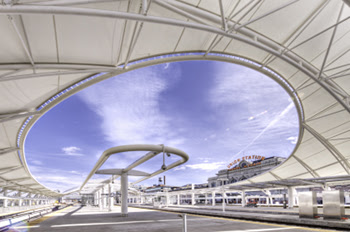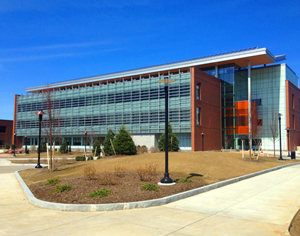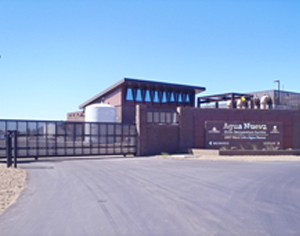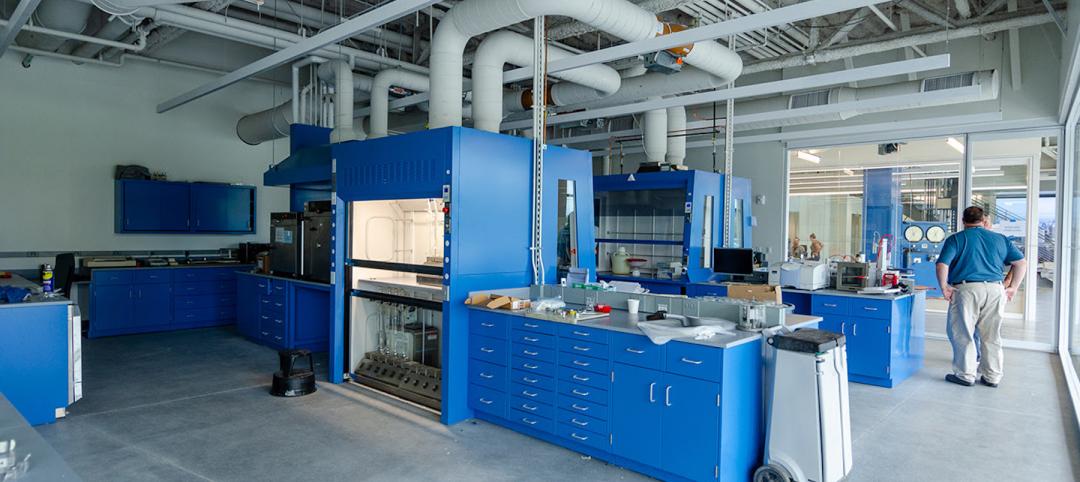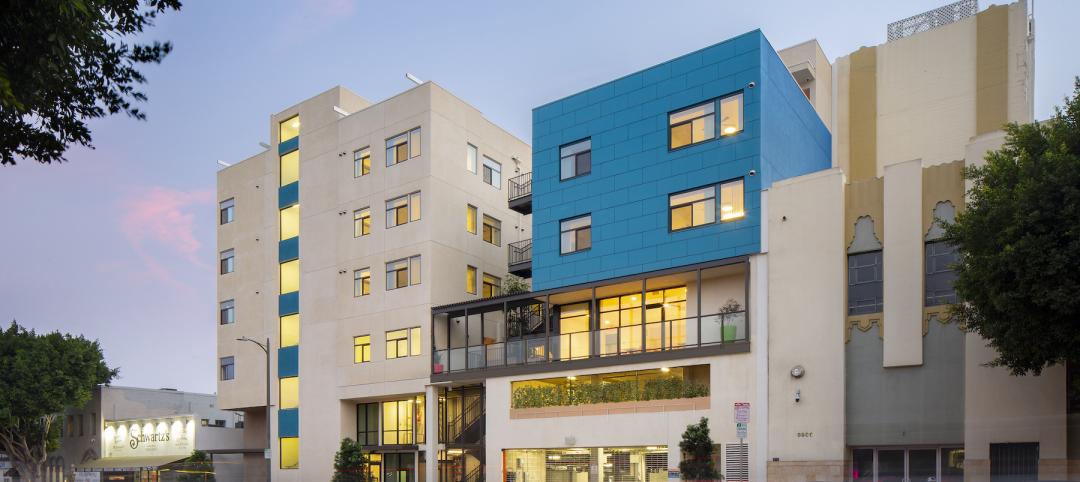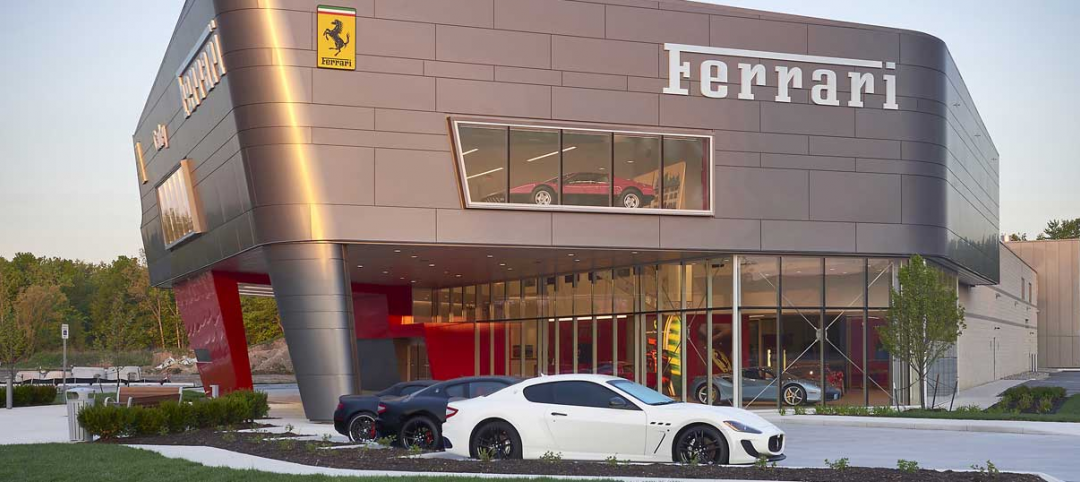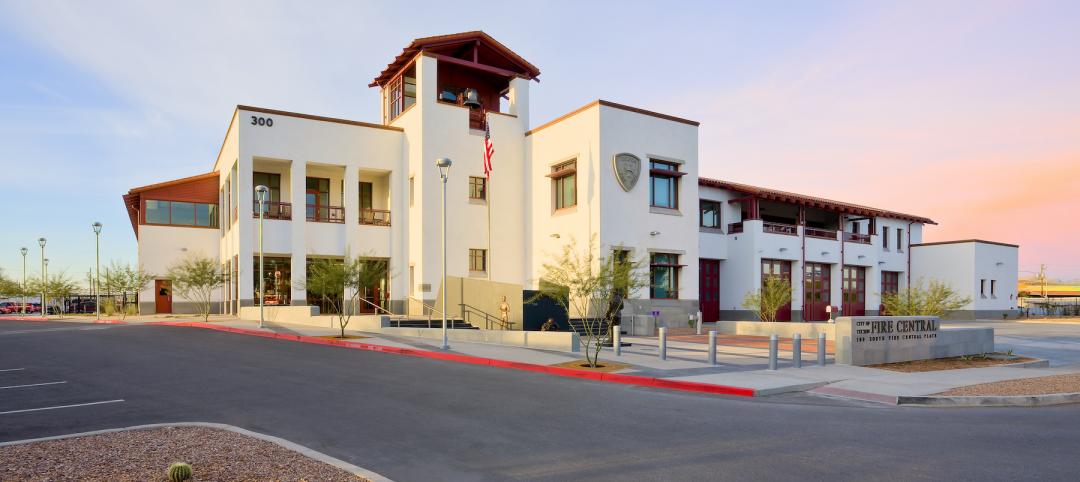The Design Build Institute of America (DBIA) has announced the 2014 Project of the Year and National Award of Excellence winners.
The Denver Union Station Transit Improvement Project has been bestowed with DBIA's highest honor, Project of the Year, with Agua Nueva, Golisano Institute for Sustainability, Henry M. Jackson Federal Building Modernization, and the San Diego International Airport Terminal 2 and Airside Expansion projects being specially recognized for excellence in the critical areas of design, process and teaming.
"This year's award competition was the most rigorous to date with a greater emphasis on best practices and teamwork, as well as the successful delivery of the project," says Lisa Washington, CAE, DBIA's Executive Director/CEO.
Recognized for exemplary collaboration and integration in design-build project delivery, the award-winning projects were evaluated by a distinguished panel of industry experts. This year, 25 projects in nine categories were awarded National Awards of Merit.
One project in each of the nine categories was then considered for best in category as a National Award of Excellence winner along with Excellence in Design, Process and Teaming awards and Project of the Year. The selected projects showcase design-build best practices, in addition to achieving budget and schedule goals and exceeding owner expectations. All photos courtesy of DBIA.
DBIA 2014 Project of the Year – Denver Union Station Transit Improvements Project
(pictured above)
The Denver Union Station Transit Improvements Project transformed 20 acres of blighted former rail yards into the vibrant centerpiece of a bustling downtown Denver, anchoring and facilitating connections between the region's transit system with all modes of public transit: an iconic, eight-track commuter rail train hall, new light-rail station and an airy, airport-like underground bus concourse with 22 bays for regional and commercial bus service. At $374.8 million and spanning 20 acres and seven city blocks, it is the largest multimodal project to seek LEED Silver certification from the USGBC. The project is a Public-Private Partnership (P3) successfully delivered under a design-build contract model.
The Project of the Year team includes: Owner: Denver Union Station Project Authority; Design-Builder, Construction Manager: Kiewit; Architect: Skidmore, Owings, and Merrill LLP; Engineer: AECOM; BIM Specialist/Construction: Legacy Mechanical Inc.; and Specialty Consultant: Hargreaves Associates.
"The remarkable Denver Union Station Project is a shining example of what can be accomplished through Design-Build Done Right," says Lisa Washington. "The project team truly took integrated project delivery to the next level by releasing design packages in alignment with construction activities, embedding lead architects and engineers in the contractors' offices and through weekly owner/architect/contractor meetings to ensure key decision-makers were frequently engaged. We could not be more proud to present this prestigious award to the Denver Union Station Project Authority and the entire project team as DBIA's 2014 Design-Build Project of the Year."
DBIA 2014 Excellence in Design – Golisano Institute for Sustainability and the Governor George Deukmejian Courthouse
The Golisano Institute for Sustainability at Rochester Institute of Technology (RIT) in Rochester, N.Y., wanted a signature building that would serve as a living laboratory for scientific discovery and experimental learning that could serve as the Western Gateway to RIT. The result is an 84,000-square-foot complex, comprised of a four-story research and three-story academic and office building connected by a four-story galleria. It houses laboratories, classrooms and office space, with high-performance design features that make it a living laboratory of sustainability. The Golisano Institute is among the first in the world to offer a Ph.D. program in sustainability.
The Governor George Deukmejian Courthouse was delivered through a unique Public-Private Partnership and is the first social infrastructure project in the United States procured under the principles of Performance-Based Infrastructure contracting. Constructed in downtown Long Beach, Calf., the design-build team successfully delivered the spectacular 545,000-square-foot courthouse and 399,000-square-foot parking facility 11 days ahead of schedule.
DBIA 2014 Excellence in Process – Agua Nueva Water Reclamation Facility
The Pima County Regional Wastewater Reclamation Department embarked on the largest capital program in its history, which includes the $172 million Agua Nueva Water Reclamation Facility in Tucson, Ariz. The 32-million-gallon-per-day facility produces A+ quality effluent and features state-of-the-art odor control technology. Key challenges were meeting stringent contractual/permit effluent requirements and compliance schedules, coordinating shutdown of the old facility with Agua Nueva startup, maintaining strong coordination with other projects and optimizing capital and life-cycle costs.
DBIA 2014 Excellence in Teaming – Henry M. Jackson Federal Building Modernization
The Henry M. Jackson Federal Building modernization in Seattle, Wash., served to reduce the building's energy consumption by 30 percent, increase the Energy Star score to 97 and achieve a LEED-EB Silver certification from the USGBC through multiple energy-related scopes. After shortlisting to three firms, cost and schedule were fixed to enable the teams to focus on innovative solutions to energy savings. To ensure accountability, the GSA used a performance guarantee that included one year of monitoring the Energy Use Intensity against goals established by the design-build teams, for which $1.8 million was held as retention.
DBIA 2014 National Award of Excellence by Category winners are:
• Aviation – The San Diego International Airport Terminal 2 and Airside Expansion, San Diego, Calif.
• Civic – FY11 228 PN UEPH Schofield Barracks, Fort Shafter, Oahu, Hawaii
• Commercial/Office – Wendell August, Grove City, Pa.
• Education – Golisano Institute for Sustainability Research Building, Rochester, N.Y.
• Healthcare – California Health Care Facility Stockton, Stockton, Calif.
• Industrial/Process/Research – Rolls-Royce Advanced Aerofoil Machining Facility, Prince George County, Va.
• Rehabilitation/Renovation/Restoration – Henry M. Jackson Federal Building Modernization, Seattle, Wash.
• Transportation – Denver Union Station Transit Improvements, Denver, Colo.
• Water/Wastewater - Agua Nueva Water Reclamation Facility, Tucson, Ariz.
Related Stories
Multifamily Housing | Apr 20, 2022
A Frankfurt tower gives residents greenery-framed views
In Frankfurt, Germany, the 27-floor EDEN tower boasts an exterior “living wall system”: 186,000 plants that cover about 20 percent of the building’s facade.
AEC Tech | Apr 19, 2022
VDC maturity and the key to driving better, more predictable outcomes
While more stakeholders across the AEC value chain embrace the concept of virtual design and construction, what is driving the vastly different results that organizations achieve? The answer lies within an assessment of VDC maturity.
Healthcare Facilities | Apr 19, 2022
6 trends to watch in healthcare design
As the healthcare landscape continues to evolve, IMEG’s healthcare leaders from across the country are seeing several emerging trends that are poised to have wide-ranging impacts on facility design and construction. Following are six of the trends and strategies they expect to become more commonplace in 2022 and the years to come.
Energy-Efficient Design | Apr 19, 2022
A prefab second skin can make old apartments net zero
A German startup is offering a new way for old buildings to potentially reach net-zero status: adding a prefabricated second skin.
Concrete Technology | Apr 19, 2022
SGH’s Applied Science & Research Center achieves ISO 17025 accreditation for concrete testing procedures
Simpson Gumpertz & Heger’s (SGH) Applied Science & Research Center recently received ISO/IEC17025 accreditation from the American Association for Laboratory Accreditation (A2LA) for several concrete testing methods.
Senior Living Design | Apr 19, 2022
Affordable housing for L.A. veterans and low-income seniors built on former parking lot site
The Howard and Irene Levine Senior Community, designed by KFA Architecture for Mercy Housing of California, provides badly needed housing for Los Angeles veterans and low-income seniors
Sponsored | BD+C University Course | Apr 19, 2022
Multi-story building systems and selection criteria
This course outlines the attributes, functions, benefits, limits, and acoustic qualities of composite deck slabs. It reviews the three primary types of composite systems that represent the full range of long-span composite floor systems and examines the criteria for their selection, design, and engineering.
Building Team | Apr 18, 2022
Shive-Hattery Acquires WSM Architects
Shive-Hattery announces that it has acquired WSM Architects, Inc., a 13-person architecture firm in Tucson, Arizona.
University Buildings | Apr 18, 2022
SmithGroup to design new Univ. of Colorado Denver engineering, design, computing building
The University of Colorado Denver selected SmithGroup to design a new engineering, design, and computing building that will serve as anchor of new downtown innovation district.
Building Team | Apr 15, 2022
Frank Gehry to design his largest building yet for his hometown of Toronto
Famed architect Frank Gehry will design his largest building to date for his hometown of Toronto, Canada.


